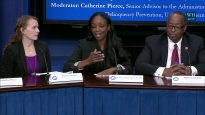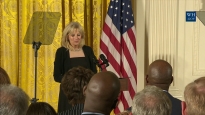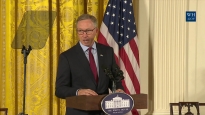President Obama Awards Sgt. Kyle J. White the Medal of Honor
May 13, 2014 | 18:41 | Public Domain
President Obama awards Kyle J. White, a former active duty Army Sergeant, the Medal of Honor for conspicuous gallantry. Sgt. White received the Medal of Honor for his courageous actions while serving as a Platoon Radio Telephone Operator assigned to C Company, 2nd Battalion (Airborne), 503rd Infantry Regiment, 173rd Airborne Brigade, during combat operations against an armed enemy in Nuristan Province, Afghanistan on November 9, 2007.
Remarks by the President at Presentation of Medal of Honor to Sergeant Kyle J. White, U.S. Army
East Room
2:44 P.M. EDT
THE PRESIDENT: Good afternoon, everybody. Please, be seated. Welcome to the White House. It has been said that true courage is “a perfect sensibility of the measure of danger, and a mental willingness to incur it.” For more than 12 years, with our nation at war, the men and women of our armed forces have known the measure of danger that comes with military service. But year after year, tour after tour, they have displayed a selfless willingness to incur it -- by stepping forward, by volunteering, by serving and sacrificing greatly to keep us all safe.
Today, our troops are coming home. By the end of this year, our war in Afghanistan will be over. And we’ll welcome home this generation -- the 9/11 Generation -- that has proven itself to be one of America’s greatest.
And today, we pay tribute to a soldier who embodies the courage of his generation -- a young man who was a freshman in high school when the Twin Towers fell, and who just five years later became an elite paratrooper with the legendary 173rd Airborne -- the Sky Soldiers. Today, we present our nation’s highest military decoration -- the Medal of Honor -- to Sergeant Kyle J. White.
Kyle is the second Sky Soldier to be recognized with the Medal of Honor for service above and beyond the call of duty in Afghanistan. Today, he joins Staff Sergeant Salvatore Giunta, and a proud brotherhood of previous honorees, members of the Medal of Honor Society -- some of whom are with us here today.
We have a lot of VIPs here, but I’d like to acknowledge the most important -- Kyle’s parents, Cheryl and Curt, and Kyle’s girlfriend, Helen. I am told that back home in Bonney Lake, Washington when Kyle wanted to enlist, at first he had his sights set on the Marines. But his dad Curt is a veteran of the Army, Special Forces. So I’m told there was a difference of opinion. (Laughter.) And, I suspect, a good family discussion. As Commander-in-Chief, I cannot take sides in this debate. (Laughter.) The bottom line is Kyle joined the Army. And in doing so he carried on his family’s proud tradition of service, which found its expression on a November day over six years ago.
Across Afghanistan, base commanders were glued to their radios, listening as American forces fought back an ambush in the rugged mountains. One battalion commander remembered that “all of Afghanistan” was listening as a soldier on the ground described what was happening. They knew him by his call sign -- “Charlie One Six Romeo.” We know it was Kyle, who at the time was just 20 years old and only 21 months into his military service.
Earlier that afternoon, Kyle and the 13 members of his team, along with a squad of Afghan soldiers, left an Afghan village after a meeting with elders. The Americans made their way back up a steep hill -- single file, along a narrow path, a cliff face rising to their right, and a slope of rocky shale dropping on their left. They knew not to stop, that they had to keep moving. They were headed into an area known as “ambush alley”.
And that’s when a single shot rang out. Then another. And then the entire canyon erupted, with bullets coming from what seemed like every direction. It was as if, Kyle said, the whole valley “lit up.”
The platoon returned fire. Kyle quickly emptied a full magazine, but as he went to load a second, an enemy grenade exploded and knocked him unconscious. He came to with his face pressed against a rock. And as he moved to get up, enemy rounds hit a rock just inches from his head, sending shrapnel and rock shards across his face.
Most of the unit had been forced to slide down the cliff to the valley below. But Kyle saw a teammate -- Specialist Kain Schilling -- trying to treat his own shattered arm, using a tree as cover -- what Kain later called “the smallest tree on Earth.” I’m sure that’s how it felt. Kyle sprinted through enemy fire to Kain’s side and began applying a tourniquet -- shielding Kain with his own body as gunfire shredded that tree.
Then Kyle saw another man down -- Marine Sergeant Phillip Bocks -- in the open, 30 feet behind them, but too injured to reach cover. Kyle remembers thinking, “It’s just a matter of time before I’m dead. If that’s going to happen, I might as well help someone while I can.”
With bullets impacting all around him, Kyle ran to Bocks and began to pull the injured Marine to cover. But worried that he’d expose Bocks to more gunfire, Kyle retreated. The enemy rounds followed him. He ran out again, pulling Bocks a little farther. And once more he retreated to distract the enemy fire. Once more he went out -- over and over thinking to himself, “I’m not going to make it.” Kyle could feel the pressure of the rounds going by him. But somehow, miraculously, they never hit him. Not once. One of his teammates said it was as if Kyle was moving “faster than a speeding bullet”.
And finally, Kyle succeeded in pulling his comrade to cover. Tragically, there on that cliff, Sergeant Bocks succumbed to his wounds. But in his final moments, this American Marine surely found some solace in Kyle White -- the American soldier who, until the very end, was there by his side.
Now, that other injured soldier, Kain Shilling, was still out there. And he had sustained another injury, this time to his knee. Kyle ran out once more to Kain’s side. Kyle ripped off his own belt for a tourniquet, and soon got his hands on a working radio. The voice of Charlie One Six Romeo came into base. Crouching behind that lone tree, Kyle began calling in airstrikes to take out enemy positions.
Kyle stayed with Specialist Schilling as night fell. And Kain was too badly injured to move. Kyle was starting to feel the fog of his own concussions set in, but he knew that he was Kain’s best chance to get out alive, so Kyle took charge and ordered the Afghan soldiers to form a security perimeter. He called in a MEDEVAC and made sure Kain and the other injured were safely on board. And only then did Kyle finally allow himself to be lifted out.
As the helicopter pulled away, Kyle looked out the window, watching the darkness as they pulled away from that single tree on the cliff. “When you’re deployed,” he later said, “those people become your family. What you really care about is: I want to get this guy to the left and to the right home.”
This family was tested that day. Not a single one of them escaped without injury, and six brave Americans gave their lives -- their last full measure of devotion. And we remember them today. Sergeant Phillip A. Bocks. Captain Matthew C. Ferrara. Specialist Joseph M. Lancour. Sergeant Jeffery S. Mersman. Corporal Lester G. Roque. And Kyle’s best friend, Corporal Sean K. A. Langevin. Some of their families are here today. I’d ask them to please stand so we can recognize their extraordinary sacrifice. (Applause.)
The legacy of these fallen heroes endures in the courage and strength of their unit -- 14 men, forever brothers-in-arms. We’re proud to welcome those who fought so valiantly that day: Specialist Kain Schilling, the soldier that Kyle saved, and members of the 2nd Battalion, Chosen Company of the 173rd Airborne Brigade. Would you please stand. (Applause.)
We honor Kyle White for his extraordinary actions on that November day. But his journey from that day to this speaks to the story of his generation. Kyle completed the rest of a 15-month deployment in Afghanistan. He came back home and trained other young paratroopers as they prepared to deploy. When he completed his service, Kyle decided to pursue a different dream, and with the help of the Post-9/11 GI Bill, he went to college, he graduated, and today works for a bank in Charlotte, North Carolina.
When Kyle walks into the office every day, people see a man in a suit headed to work. And that’s how it should be -- a proud veteran welcomed into his community, contributing his talents and skills to the progress of our nation. But Kyle will tell you that the transition to civilian life -- and dealing with the post-traumatic stress -- hasn’t always been easy. More than six years later, he can still see the images and hear the sounds of that battle. Every day, he wakes up thinking about his battle buddies.
And if you look closely at that man in the suit on his way to work, you’ll notice the piece of the war that he carries with him tucked under his shirt sleeve -- a stainless steel bracelet around his wrist etched with the names of his six fallen comrades who will always be with him. “Their sacrifice motivates me,” he says, to “be the best [that] I can be. Everything I do in my life is done to make them proud.”
Kyle, members of Chosen Company, you did your duty, and now it’s time for America to do ours: After more than a decade of war, to welcome you home with the support and the benefits and opportunities that you’ve earned. You make us proud, and you motivate all of us to be the best we can be as Americans, as a nation; to uphold our sacred obligations to your generation and all who have faced that “measure of danger” and “the willingness to incur it.”
May God bless you, and may your courage inspire and sustain us always. And may God continue to bless the United States of America.
With that, I’d like to have the citation read.
MILITARY AIDE: The President of the United States of America, authorized by Act of Congress, March 3, 1863, has awarded in the name of Congress the Medal of Honor to Specialist Kyle J. White, United States Army.
Specialist Kyle J. White distinguished himself by acts of gallantry and intrepidity at the risk of his life above and beyond the call of duty while serving as a radio telephone operator with Company C, 2nd Battalion Airborne, 503rd Infantry Regiment, 173rd Airborne Brigade during combat operations against an armed enemy in Nuristan Province, Afghanistan on November 9, 2007.
On that day, Specialist White and his comrades were returning to Bella Outpost from a shura with Aranas village elders. As the soldiers traversed a narrow path surrounded by mountainous, rocky terrain, they were ambushed by enemy forces from elevated positions. Pinned against a steep mountain face, Specialist White and his fellow soldiers were completely exposed to enemy fire. Specialist White returned fire and was briefly knocked unconscious when a rocket-propelled grenade impacted near him.
When he regained consciousness, another round impacted near him, embedding small pieces of shrapnel in his face. Shaking off his wounds, Specialist White noticed one of his comrades lying wounded nearby. Without hesitation, Specialist White exposed himself to enemy fire in order to reach the soldier and provide medical aid.
After applying a tourniquet, Specialist White moved to an injured Marine, providing aid and comfort until the Marine succumbed to his wounds. Specialist White then returned to the soldier and discovered that he had been wounded again. Applying his own belt as an additional tourniquet, Specialist White was able to stem the flow of blood and save the soldier’s life.
Noticing that his and the other soldiers’ radios were inoperative, Specialist White exposed himself to enemy fire yet again in order to secure a radio from a deceased comrade. He then provided information and updates to friendly forces, allowing precision airstrikes to stifle the enemy’s attack and ultimately permitting medical evacuation aircraft to rescue him, his fellow soldiers, Marines, and Afghan army soldiers.
Specialist Kyle J. White. Extraordinary heroism and selflessness above and beyond the call of duty are in keeping with the highest traditions of military service and reflect great credit upon himself, Company C, 2nd Battalion Airborne, 503rd Infantry Regiment, 173rd Airborne Brigade, and the United States Army. (Applause.)
(Prayer.)
THE PRESIDENT: That concludes the ceremony, but not the celebration. I hear the food here is pretty good. (Laughter.) And the drinks are free. (Laughter.) Who gave a big shout on that? I heard somebody. (Laughter.) But I hope all of you enjoy the hospitality of the White House. I hope we all remember once again those who are fallen. We are grateful to the families who are here. And to Kyle and all who serve in America’s Armed Forces, we want you to know that we will always be grateful for your extraordinary service to our country.
Thank you very much, everybody. Have a great afternoon. (Applause.)
END
3:04 P.M. EDT
|
November 15, 2016
|
November 15, 2016
|
November 14, 2016
|
November 14, 2016
|
|
November 14, 2016
|
November 14, 2016
|
November 14, 2016
|
November 14, 2016
|
- &lsaquo previous
- …
- 8
- 9
- 10
- 11
- 12
- 13
- 14
- 15
- 16
- …
- next &rsaquo







